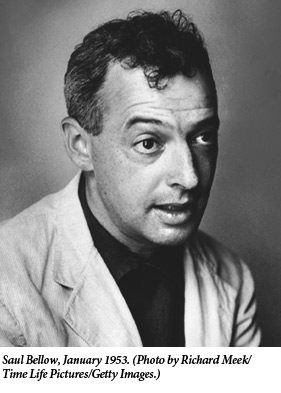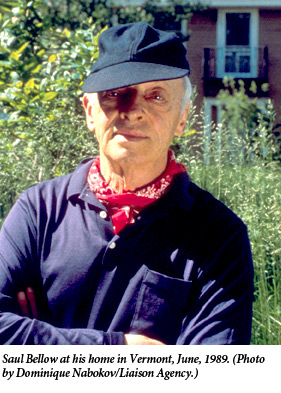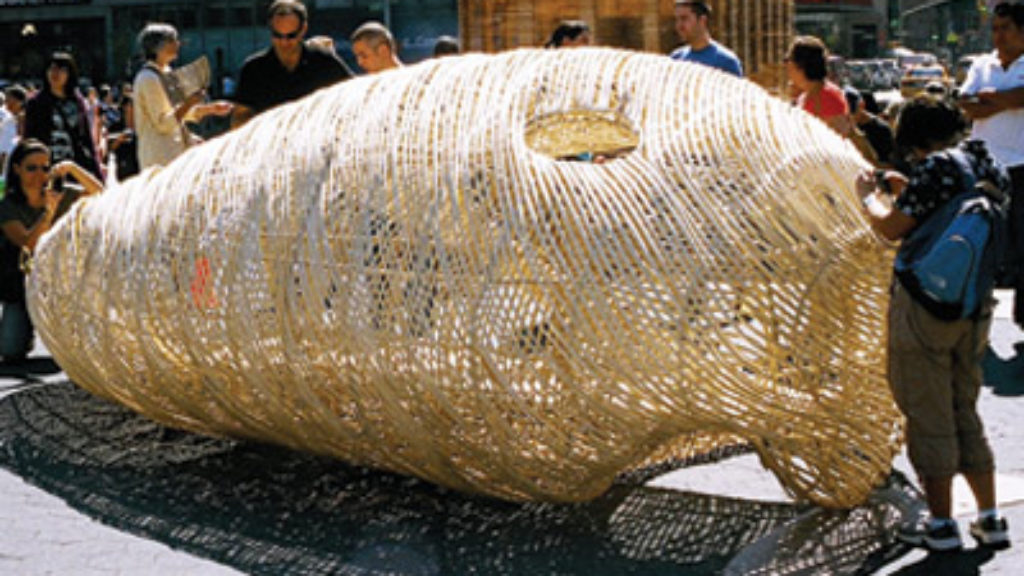Letters From Chicago
Here is Saul Bellow describing Chicago at its worst: “On winter afternoons . . . the soil was frozen to a depth of five feet and the Chicago cold seemed to have the headhunter’s power of shrinking your face . . .” Bellow himself was whipsawed, time and again, over his long career between critical acclaim and blasts as ferocious as the winds off Chicago’s brutal, gorgeous lake.

The gap between critical appraisal and character assassination was often paper-thin. Mark Harris built an entire book, Saul Bellow: Drumlin Woodchuck, around the mystifying conceit that he was a rodent (“a woodchuck is very smart. A woodchuck has the sense to hide.”) In Saul Bellow: A Biography of the Imagination, Ruth Miller, an ex-student and discarded lover, explained Bellow’s politics as the result of bad parenting. James Atlas’ massive and influential Bellow: A Biography was the product of a great deal of labor and not inconsiderable bile (as a biographer, Atlas seems to have aspired to the headhunter’s power too). Bellow was reduced to a crabbed man, as vain as a movie star and as promiscuous as an alley cat. One gets little sense from Atlas of how his subject produced indispensable novel after novel, except to the extent (admittedly always large for Bellow) that they were quarried from his hopelessly messy life.
Of course, Bellow was graced with many gushes of warm wind too: relatively early acclaim, close literary friendships that were surprisingly free of rancor and envy (though Bellow was entirely capable of both), and, eventually, every award including the Nobel Prize. One of his great literary friends, Philip Roth, wrote as lovingly astute a summation of his his career as has been written about any American writer of the last century. In “Rereading Bellow,” Roth focused, as have so many others, on Bellow’s voice, his sentence-by-sentence genius, as it burst forth in his first great book:
Engorged sentences had existed before in American fiction—notably in Melville and Faulkner—but not quite like those in Augie March, which strike me as more liberty-taking . . . There are sentences in the book whose effervescence, whose undercurrent of buoyancy leave one with the sense of so much going on, a theatrical, exhibitionist, ardent prose tangle that lets in the dynamism of living without driving mentalness out. This voice no longer encountering resistance is permeated by mind while connected also to the mysteries of feeling. It’s a voice unbridled and intelligent both, going at full force and yet always sharp enough to sensibly size things up.
Ben Taylor’s meticulously edited and annotated volume of Bellow’s letters provides the most intimate glimpse we have yet encountered of how this voice emerged. Saul Bellow: Letters is drawn from several archives and many private collections and takes its place beside the best of such compilations. Although there is nothing in the volume as explosive as, say, the intermittent anti-Semitism or sexual frivolities found in Philip Larkin’s letters, it offers a comparable close-up of a great writer’s workshop. This is all the more crucial in Bellow’s case since we still lack a first-rate biography.
Bellow came of age as a writer in the mid-1940s as part of the intellectual and artistic cohort around magazines like Partisan Review, The New Republic, and Commentary, all of which were eager for America to capture a literary role in the world comparable to its diplomatic one. Bellow made this aspiration his own, but first came rejected manuscripts (the letters describe two discarded novels that have never been found), tawdry apartments, and a failed early marriage. Even when he achieved critical success, sales did not follow. “Surely you don’t mean that the total sales of the book come to two thousand!” he writes his editor in 1948, soon after the appearance of his second novel, The Victim. “Why, you wrote last November that it had an advance sale of twenty three hundred . . . I don’t understand this at all; I feel black and bitter about it, merely.” (The characteristic Bellovian touch is in that “merely.”)
In the late 1940s, Bellow was just scraping by, viewed as important by influential critics but also seen, much to his distress, as something of a wastrel by his businessmen father and brothers, who still gave him occasional handouts. Then, while in Paris in 1949, on a Guggenheim fellowship, working on yet another grim novel, he began sketching, almost doodling, the work that would become The Adventures of Augie March. What emerged was an altogether different sort of manuscript, something freer, less dark, and curiously enough, less European.
His previous two novels had been taut, internal books, written under the influence of Dostoevsky (Dangling Man‘s original title was Notes of a Dangling Man.) Yet he had long worried about why he felt so inhibited on the page, why, as he put it to his Trotskyist friend David Bazelon in 1948, “there is a certain diffidence about me . . . I assemble the dynamite but I am not ready to touch off the fuse.” With Augie March, Bellow exploded. He explained what it felt like to touch off the fuse in the novel itself, a description of the creative process as brilliant and candid as any produced by a novelist:
Hard, hard work, excavation and digging, mining, moling through tunnels, heaving, pushing, moving rock, working, working, working, working, working, panting, hauling, hoisting. And none of this work is seen from the outside. It’s internally done. It happens because you are powerless and unable to get anywhere, to obtain justice or have requital, and therefore in yourself you labor, you wage and combat, settle scores, remember insults, fight, reply, deny, blab, denounce, triumph, outwit, overcome, vindicate, cry, persist, absolve, die and rise again. All by yourself! Where is everybody? Inside your breast and skin, the entire cast.
When Augie March was a hit, the attacks began, with the most robust on the pages of the magazines that had most vigorously first promoted Bellow. “We acted,” mused Partisan Review editor William Phillips in his memoirs, “as though . . . in a primitive struggle for survival.”
Bellow attracted special attention, no doubt, because of his success coupled with a never sated touchiness and a voracious ambitiousness that stood out even in a milieu packed with outsized egos. More galling still, he was also the author that captured, in the famous first lines of Augie March, the ambition of an entire generation of Jewish writers—and others, too—to claim America as their own:
I am an American, Chicago born—Chicago, that somber city—and go at things as I have taught myself, free-style, and will record in my own way: first to knock, first admitted; sometimes an innocent knock, sometimes a not so innocent.
The subsequent jealousy was thick, especially as he went on, time and again, to write utterly distinct and brilliant novels that drew promiscuously on lives close to his while always keeping the best of himself for his writing desk.
Among the critical complaints lodged against Bellow were that he was too talky, a writer of the mind not of the heart. Bellow’s sixth novel, Herzog, helped to solidify this perception. Interspersed throughout the book were Moses Herzog’s manic, obsessive, and breathtakingly smart letters to family, friends, lovers, philosophers, and politicians (“Dear Mr. President, Internal Revenue regulations will turn us into a nation of bookkeepers. The life of every citizen is becoming a business. This, it seems to me, is one of the worst interpretations of the meaning of human life history has ever seen.”). This perception was belied by Bellow’s preoccupation with the inescapability of feeling, but it was buttressed by his portrayals of women, ex-wives in particular—”will never understand what women want. What do they want? They eat green salad and drink human blood.” Despite all the acclaim, for many years Bellow was cast aside, even by some serious readers, as somehow too serious, too angry, too old-fashioned, and not quite worth the effort.
One of the many pleasures of Taylor’s volume is how it reacquaints us with Bellow’s wry, poignant, infectiously erudite voice. This is all the more surprising because he wasn’t, or at least so he insisted, a natural-born letter writer. He would often claim, a little grandly, that it was easier for him to finish a short story, even a novel, than a letter, and he criticized Isaac Rosenfeld, the literary-brother of his youth, for his long and wasteful bouts of letter writing. Indeed, many of Bellow’s most striking letters are about the joys and rigors of solitary writing. To Susan Glassman, who would soon be his third wife, he describes his work on Herzog:
I live on broiled meat and salt-pills and my brains and insides go around at high speed. Have you ever visited a clothing factory, heard the sewing machines rrrhhhahhhrr with the loudness in the middle of the phrase? I feel like that myself . . . Only the machinery is internal and seams never end.
Another pleasure is the chance to hear Bellow describe Chicago, where most of his greatest novels were set. The city both fascinated and horrified him; it was proof of both life’s plentitude and griminess. In his essay, Philip Roth notes that Bellow first shied away from writing about the city. Dangling Man, while situated there, took in Chicago barely at all. (“Dangling Man is not a book about a man in a city: it’s about a mind in a room.”) At first, writes Roth, Bellow may well have feared being seen as merely a local writer much as he resisted being slotted as a Jewish one. The two, Roth proposes, were arguably for Bellow then, and always, interlinked:
I wonder if at the outset Bellow shied away from seizing Chicago as his because he didn’t want to be as a Chicago writer, any more, perhaps, than he wanted to be known as a Jewish writer. Yes, you’re from Chicago, and of course you’re a Jew—but how these things are going to figure in your work, or if they should figure at all, isn’t easy to puzzle out right off. Besides, you have other ambitions, inspired by your European masters, by Dostoevsky, Gogol, Proust, Kafka, and such ambitions don’t include writing about the neighbors gabbing on the back porch . . .
Roth, of course, might have been speaking about himself as well. One of the more salient features of the work of both writers is their capacity to encompass so much while remaining so fixed on the turbulence of oneself. Both were loners, eager each in their own way, for some true shred of community, though in the privacy of their letters, both savaged so many of those near to them. When Bernard Malamud died, Bellow wrote to Roth: “He did make something of the crumbs and gritty bits of impoverished Jewish lives. Then he suffered from not being able to do more.”
The tension between the “gritty bits” that most achingly inspires one’s imagination and a no less aching desire to produce world-class fiction, is the spine that holds this volume of letters—and, arguably, also Bellow’s remarkable literary career-together. “Our language was English, and a language is a spiritual mansion from which no one can evict us.” Bellow resolutely believed this, but he offered it up in a speech honoring Malamud after this death at the American Academy and Institute of Arts and Letters where he declared Malamud “a rich original of the first rank.”
Bellow had sent his letter to Roth about Malamud’s imaginative life just a few months earlier. Of course, the gap between a eulogy and a confidence between friends is, justly, substantial. Indeed, one of the pleasures of reading volumes of letters is the access they seem to give to the writer’s private thoughts. Arguably, though, such letters exist at something of a mid-way point between the private and the public. It is never quite clear when reading letters like these whether you are engaged in a slightly wicked, prurient activity or have been hoodwinked by a sly master, who was always writing for posterity as well as his addressee.
Hoodwinked or not, Bellow’s language in letters, as in fiction, is stunning. His is an English both earnestly and adoringly cerebral and earthy, drawing on the cadences of the Hebrew Bible and the New Testament, Hyde Park Trotskyism, the high-church intellectualism of the University of Chicago, and the Guys and Dolls patois of Damon Runyon. He sometimes compared his writing to an act of escape. In a letter to novelist and essayist Edward Hoagland, after finishing Herzog, he writes:
Oddly enough, I do feel extraordinarily locked-up, and some of my books, especially Augie March, are written in a jail-breaking spirit. And most prison breaks, like most revolutions, are unsuccessful. After I had written The Victim, I felt the limitation of conventional despair and disappointment, and all the rest of it, of that romanticism which makes excessive and ridiculous demands for the individual and seems ignorant of what there really is to ask for. In the excitement of freeing myself, I think I went too far . . . As for Henderson, I understand it least of all my books.
As fantastic an imagination as he possessed (and Henderson the Rain King found his soul in an Africa conjured entirely out of Bellow’s mind), and as impractical as he was in life and love, Bellow nonetheless retained a steady, emphatic belief in the primacy of what he insisted on calling “reality.” Sometimes he meant the term as an aesthetic category: the capacity to produce art that evades nothing. Writing to Roth in 1969, he gives him his highest compliment: “I knew . . . that you were the real thing. When I was a little kid, there were still blacksmiths around, and I’ve never forgotten the ring of a real hammer on a real anvil.” What he disliked most in Malamud’s later novels, like Dubin’s Lives, was their insistence, as he saw it, on prettifying life.

But Bellow’s notion of reality also had a moral and, in some measure, a political sense. To confront reality was a virtue even if it involved ethical compromise. Practical men of the world, like Jerusalem’s mayor Teddy Kollek, who Bellow nominated for a Nobel Prize, drew him in, impressing him with their ability to get things done. “And, yes, I know all about Teddy,” he writes his friend, the Yiddish scholar Ruth Wisse, “the schemer, finagler, and arranger. With all his less-than-admirable qualities, he towers over most of the political figures I have known.” For the same reasons, and perhaps with his own father’s checkered, aggressive business career as bootlegger and coal-yard owner in mind, Bellow was awestruck by Chicago’s blustery, bigger-than-life politicos and businessmen. Although ordinarily he was quick to take offense, rarely was he insulted by their indifference to his accomplishments.
He managed his own finances badly; launched a series of magazines that all flopped; tried his hand at Broadway (also a failure); and often bemoaned his incapacity to understand the real world. Recalling a conversation with his longtime academic patron, Ralph Ross, who was also close with Isaac Rosenfeld, Bellow writes, “You said that Isaac was the most unworldly person you had ever known, with one exception: Compared with me, Isaac was the complete sophisticate . . .”
The need to acknowledge reality, however unpleasant, would come to mesh in his thinking with his sense of kinship, of common fate, with Jews. “I’m often tempted to take the Nabokov-Literature-Only line,” he writes to novelist and essayist Cynthia Ozick. “Perhaps it was easier for him. The situation of a Russian in exile (a Christian one, after all) can’t approach that of a Jew with its splendid complications and singular horrors.” Mr. Sammler’s Planet, Bellow’s most biting, polemical novel, included an essay-like condemnation of Hannah Arendt’s Eichmann in Jerusalem. Above all, Bellow/Sammler condemned Arendt for her failure to see what might realistically be expected from people in the darkest times. “She could often think clearly, but to think simply was altogether beyond her,” Bellow writes in a 1982 letter to the young Leon Wieseltier.
To Ozick, he writes a remarkable letter in 1987, after reading her novel The Messiah of Stockholm, with something of a confession regarding his own trajectory as a once-lamentably indifferent Jew:
I was too busy becoming a novelist to take note of what was happening in the Forties. I was involved with ‘literature’ and given over to preoccupations with art, with language, with my struggle on the American scene, with claims for recognition of my talent or, like my pals of the Partisan Review, with modernism, Marxism, New Criticism, with Eliot, Yeats, Proust, etc.-with anything except the terrible events in Poland. Growing slowly aware of this unspeakable evasion I didn’t even know how to begin to admit it into my inner life. Not a particle of this can be denied. And can I really say—can anyone say—what was to be done, how this ‘thing’ ought to have been met? Since the late Forties I have been brooding about it and sometimes I imagine I can see something. But what such broodings may amount to is probably insignificant . . . I can’t even begin to understand what responsibility any of us may bear in such a matter, in a crime so vast that it brings all Being into Judgment.
The letter is itself a distinguished contribution to what he calls in another letter “the history of Jewish feeling.”
Bellow‘s letters deepened in intensity, even beauty, as he aged. He remained, despite his accomplishments and fame, the wide-eyed Midwesterner astonished at the manifold pleasures life had to offer. Happy with his fifth wife, Janis, in ways he never, it seems, had before experienced, he writes in a letter in 1990, “I have no serious diseases and at seventy-five with foolish enthusiasm I pedal a bike up and down the Vermont hills. The neighbors take me for some kind of crazy prodigy.”
Suggested Reading

What If Everyone Is Right?
What If Everyone Is Right?

Temporary Measures: Sukkah City
The reimagining of an ancient architectural ritual.
Category Error
What is lost when the books of the Hebrew Bible are read as philosophy?
Missed Connections
Joseph Skibell, like any good historical novelist, is a dybbuk—he animates the dead.
Comments
You must log in to comment Log In